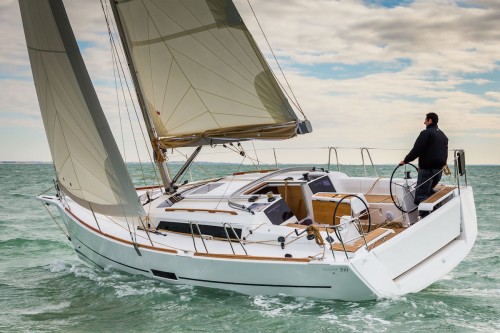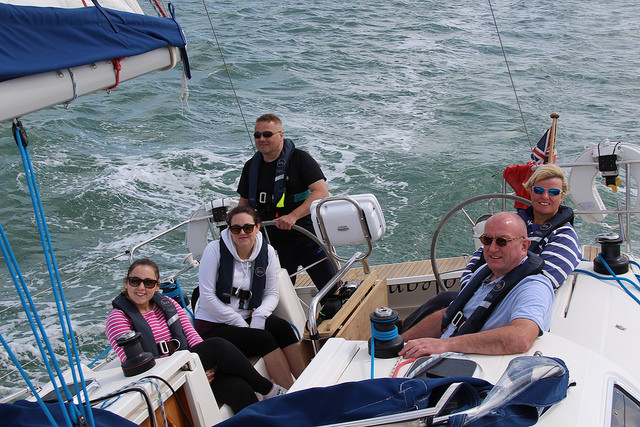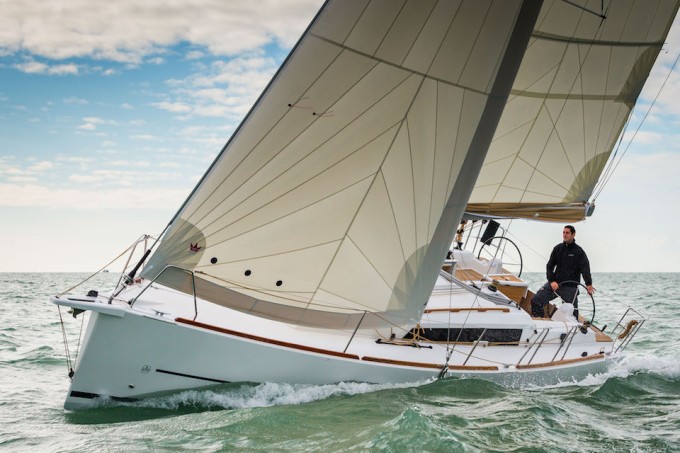
The old adage that ‘you never stop learning’ could not be more applicable than to sailing. Whilst anyone can just get in a boat, it’s wise to get some training and experience before setting off over the horizon.
Recognised around the world, RYA (Royal Yachting Association) training courses and qualifications are designed to encourage high standards of seamanship and navigation.
Courses are delivered through over 2500 RYA recognised Training Centres across 49 countries. The RYA Tick Mark logo indicates Centres will have fully qualified instructors, suitable yachts conforming to MCA regulations, and appropriate safety management processes in place.
Courses are delivered through over 2500 RYA recognised Training Centres across 49 countries. The RYA Tick Mark logo indicates Centres will have fully qualified instructors, suitable yachts conforming to MCA regulations, and appropriate safety management processes in place.
“Obtaining an RYA qualification means you have achieved a clearly recognised standard providing the practical skills and essential knowledge for your safety and enjoyment afloat,” comments RYA Training Manager, Richard Falk. “The courses are designed to provide everything you need to learn safely and build confidence, giving a great foundation to go and build your experience on your own.”
Choosing a training centre
Having a clear idea of your sailing aspirations will influence where to learn. Whether your goals are day sailing with friends and family, charter sailing on the Mediterranean or blue water cruising around the World, picking the right venue and training is important.
Most commercial Training Centres offer a variety of courses throughout the year, and have a selection of boats for building experience. Many sailing clubs are approved Training Centres, although whilst courses may be lower cost, not all clubs have the range of relevant courses, dates and facilities available.
If your plans are only sailing in non-tidal waters such as the Med, courses at a holiday venue can be an easy start. Navigation and manoeuvring are definitely less complicated without the affects of tide. Learning in busy tidal, complicated waters, such as the Solent, dealing with a complete range of conditions and commercial traffic, will assist you to become a more competent, experienced and well rounded sailor. If you learn to sail in non-tidal waters there are conversation courses should you subsequently wish to gain tidal experience.
Which course for you?
The RYA Start Yachting and Competent Crew courses are both water based courses aimed at novices and do not require any previous experience.
Start Yachting:
Normally a two day course, you will achieve a basic knowledge of yachting, experienced steering a yacht, sail handling, rope work, rules of the road and be aware of safety and emergency procedures onboard. It’s a great way to establish if yacht sailing is for you, without investing too much time and money.
Normally a two day course, you will achieve a basic knowledge of yachting, experienced steering a yacht, sail handling, rope work, rules of the road and be aware of safety and emergency procedures onboard. It’s a great way to establish if yacht sailing is for you, without investing too much time and money.
Competent Crew:
Typically 5 days this course is an introduction to cruising and teaches personal safety, seamanship and helmsmanship. It’s ideal for people seeking to step up from dinghy sailing, or who have tried yacht crewing and want to learn more.
Typically 5 days this course is an introduction to cruising and teaches personal safety, seamanship and helmsmanship. It’s ideal for people seeking to step up from dinghy sailing, or who have tried yacht crewing and want to learn more.
The course includes yachting terminology, rigging and sails, ropework, fire precautions and fighting, man overboard, emergency equipment, meteorology, seasickness, general duties and manners. After the course you will be able to steer, handle sails, keep a lookout and be a useful crew. It can be completed in 3 days if you have already done Start Sailing.

Move up the ladder
Once armed with the basic skills you will want to get afloat. Joining a club, taking part in cruising rallies, sailing with friends, there’s many ways to build your experience.
Once armed with the basic skills you will want to get afloat. Joining a club, taking part in cruising rallies, sailing with friends, there’s many ways to build your experience.
If you plan to own or charter a yacht, or sail with friends and family less experienced than you, the RYA offers further training stages – the RYA Day Skipper, Coastal Skipper, Yachtmaster Coastal and Yachtmaster Offshore. Each course progresses you to a higher level, enabling you to sail further afield and throughout the night.
Chris Warwick, MD of Universal Yachting based in Hamble comments “The courses are carefully pitched for different levels of expertise. You can enter the RYA scheme at any level, depending on your experience and abilities. The courses reinforce good practice, can fill in the gaps in your experience and knowledge, and are a quick way to refresh rusty skills – which can help boost confidence too!”
It is counter productive to attempt a course above your standard, as the courses assume, and suggest, a minimum level of pre-course experience.
Day Skipper:
An intensive 5 day course, and the minimum requirement to charter a yacht. It includes boat handling, sail selection, all aspects of being a skipper, pilotage, navigation, seamanship, weather forecasting, victualing and passage planning. Requirements:
5 Days sea time / 100 miles / 4 night hours
Navigation to Day Skipper – shorebased standard
Basic sailing ability
Day Skipper:
An intensive 5 day course, and the minimum requirement to charter a yacht. It includes boat handling, sail selection, all aspects of being a skipper, pilotage, navigation, seamanship, weather forecasting, victualing and passage planning. Requirements:
5 Days sea time / 100 miles / 4 night hours
Navigation to Day Skipper – shorebased standard
Basic sailing ability
Many countries require sailors to have an ICC (International Certificate of Competence), which is the equivalent to the RYA Day Skipper.

Coastal Skipper:
This covers the skills and techniques required to skipper a cruising yacht safely on coastal and offshore passages by day and night. The requirements assume attendees will be competent sailors with a good knowledge navigation theory and meteorology:
15 Days sea time with 2 days as skipper / 300 miles / 8 night hours
Navigation to Day Skipper – shorebased standard
Competent / Day skipper sailing ability
This covers the skills and techniques required to skipper a cruising yacht safely on coastal and offshore passages by day and night. The requirements assume attendees will be competent sailors with a good knowledge navigation theory and meteorology:
15 Days sea time with 2 days as skipper / 300 miles / 8 night hours
Navigation to Day Skipper – shorebased standard
Competent / Day skipper sailing ability
Top of the class
Requiring considerably more pre-course experience, the next stages are the RYA Yachtmaster Coastal, Offshore and Ocean Certificates of Competence. These will thoroughly demonstrate your sailing abilities and can lead on to commercial endorsement and career opportunities. Whilst Training Centres will run Yachtmaster preparation courses, the qualifications are gained only by examination conducted by an independent RYA Yachtmaster examiner.
Requiring considerably more pre-course experience, the next stages are the RYA Yachtmaster Coastal, Offshore and Ocean Certificates of Competence. These will thoroughly demonstrate your sailing abilities and can lead on to commercial endorsement and career opportunities. Whilst Training Centres will run Yachtmaster preparation courses, the qualifications are gained only by examination conducted by an independent RYA Yachtmaster examiner.
Alternative learning opportunities
In addition to the formal RYA qualifications, we offer courses such as cross channel or long distance mile building cruises to build your experience,
In addition to the formal RYA qualifications, we offer courses such as cross channel or long distance mile building cruises to build your experience,
For example, we offer a variety of bespoke courses where you can develop specific elements of your sailing expertise. A day spent on a sail handling can really help understand how to get the best performance from your boat upwind and downwind. And an own boat familiarisation or Boat handling courses are particularly helpful to focus on manoeuvring in tight spaces and parking.
